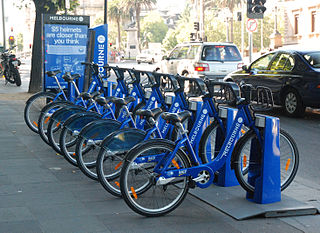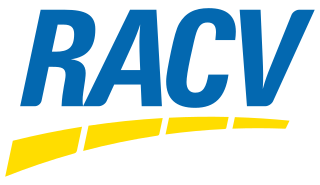A multiple listing service is an organization with a suite of services that real estate brokers use to establish contractual offers of cooperation and compensation and accumulate and disseminate information to enable appraisals. A multiple listing service's database and software is used by real estate brokers in real estate, representing sellers under a listing contract to widely share information about properties with other brokers who may represent potential buyers or wish to work with a seller's broker in finding a buyer for the property or asset. The listing data stored in a multiple listing service's database is the proprietary information of the broker who has obtained a listing agreement with a property's seller.

A bicycle-sharing system, public bicycle scheme, or public bike share (PBS) scheme, is a shared transport service in which bicycles are made available for shared use to individuals on a short term basis for a price or free. Many bike share systems allow people to borrow a bike from a "dock" and return it at another dock belonging to the same system. Docks are special bike racks that lock the bike, and only release it by computer control. The user enters payment information, and the computer unlocks a bike. The user returns the bike by placing it in the dock, which locks it in place. Other systems are dockless.

BCS, The Chartered Institute for IT, was formerly known as the British Computer Society. It is a professional body and a learned society that represents those working in information technology (IT) and computer science, both in the United Kingdom and internationally. Founded in 1956, BCS has played an important role in educating and nurturing IT professionals, computer scientists, computer engineers, upholding the profession, accrediting chartered IT professional status, and creating a global community active in promoting and furthering the field and practice of computing.

The NRMA is an Australian organisation offering roadside assistance, motoring advice, car servicing, International Driving Permits, travel, and other services in New South Wales and the Australian Capital Territory. It is a member-owned mutual organisation.

The Royal Automobile Club of Victoria (RACV) is a motoring club and mutual organisation which provides its members with a range of products and services in the areas of motoring and mobility, home, leisure, financial services and general insurance.

ADAC is Europe's largest motoring association. It would be more aptly described today as an individual mobility association since it looks more broadly at all transport options ensuring individual mobility. Its seat is in Munich. The object of ADAC is “the representation, promotion and advocacy of motoring, motorsport and tourism interests.” Its original and most well-known service is roadside assistance. The club also offers other products and services – directly or through subsidiaries, distributes city maps, road maps and road atlases and operates several driver safety centres. It works together closely with its Austrian counterpart ÖAMTC. Via its charitable subsidiary ADAC Luftrettung gGmbH, ADAC operates the largest fleet of ambulance helicopters in Germany. In 2019, the ADAC helicopters started into approx. 54,000 missions.

Motorcycling is riding a motorcycle. For some people, motorcycling may be the only affordable form of individual motorized transportation, and small-displacement motorcycles are the most common motor vehicle in the most populous countries, including India, China and Indonesia.
StattAuto CarSharing GmbH, Berlin, was the first carsharing corporation in Germany and the second worldwide. It changed its name to Greenwheels AG in 2005.

The Gesellschaft zur Verfolgung von Urheberrechtsverletzungen e.V. is a registered association under German law. According to its own description it works for the video game industry and film industry and helps to protect intellectual property and to counter the illegal distribution of copied materials. For this purpose, the association cooperates with the Motion Picture Association of America (MPAA).
Public water supply and sanitation in Germany is universal and of good quality. Some salient features of the sector compared to other developed countries are its very low per capita water use, the high share of advanced wastewater treatment and very low distribution losses. Responsibility for water supply and sanitation provision lies with municipalities, which are regulated by the states. Professional associations and utility associations play an important role in the sector. As in other EU countries, most of the standards applicable to the sector are set in Brussels. Recent developments include a trend to create commercial public utilities under private law and an effort to modernize the sector, including through more systematic benchmarking. The Rine also runs through Germany

Copyright infringement is the use of works protected by copyright law without permission for a usage where such permission is required, thereby infringing certain exclusive rights granted to the copyright holder, such as the right to reproduce, distribute, display or perform the protected work, or to make derivative works. The copyright holder is typically the work's creator, or a publisher or other business to whom copyright has been assigned. Copyright holders routinely invoke legal and technological measures to prevent and penalize copyright infringement.
The German banking system is structured in three different pillars, totally separated from each other. They typically differ in their legal form and the ownership. Private banks, represented by banks like Deutsche Bank or Commerzbank as listed companies, and Hauck & Aufhäuser or Bankhaus Lampe as less known private companies, are part of the first pillar. The second pillar is composed of co-operative banks like the numerous Volksbanken and Raiffeisenbanken. They are based on a member-structure where each member, independently from its capital share, has one vote. The third pillar consists of public banks, which are a legally defined arm of the banking industry in Germany. They are further divided into two main groups.

Momo Car-Sharing is an Intelligent Energy Europe (IEE) project intended to promote a sustainable mobility culture supporting various transport options aside from car ownership. It has a total budget of €2,693,644, 50% co-financed by the European Union. The project acronym momo stands for more options for energy efficient mobility through Car-Sharing.

Shared transport or shared mobility is a transportation system where travelers share a vehicle either simultaneously as a group or over time as personal rental, and in the process share the cost of the journey, thus creating a hybrid between private vehicle use and mass or public transport. It is a transportation strategy that allows users to access transportation services on an as-needed basis. Shared mobility is an umbrella term that encompasses a variety of transportation modes including carsharing, Bicycle-sharing systems, ridesharing companies, carpools, and microtransit.
The Bundesverband Musikindustrie, or simply BVMI, represents the music industry in Germany. The association represents the interests of nearly 280 labels and music industry related enterprises, which comprise 90% of the music industry.
cambio CarSharing is a carsharing company which was formed in 2000 as a merger of several carsharing companies in different cities in Germany and Belgium. Cambio is a member of Bundesverband CarSharing e.V. (bcs), the industry association of the traditional car sharing organisations in Germany.

The ENX Association is an association of European vehicle manufacturers, suppliers and organisations.
Stadtmobil is a carsharing company in Germany, actually a group of seven regional companies with a common brand, common marketing, common website, reservation system, and common development of software and car access technology.
Mobility-as-a-Service (MaaS) is a type of service that through a joint digital channel enables users to plan, book, and pay for multiple types of mobility services. The concept describes a shift away from personally-owned modes of transportation and towards mobility provided as a service. This is enabled by combining transportation services from public and private transportation providers through a unified gateway that creates and manages the trip, which users can pay for with a single account. Users can pay per trip or a monthly fee for a limited distance. The key concept behind MaaS is to offer travelers mobility solutions based on their travel needs. Specialist urban mobility applications are also expanding their offerings to enable MaaS, such as Transit, Uber and Lyft.
The Bundesverband Deutsche Startups is a membership corporation based in Berlin and an association of the German startup industry. It was founded in 2012 to represent and function as a voice of startups vis-à-vis politics, civil society and the established economy. The association is committed to a founder-friendly Germany, promotes innovative entrepreneurship and wants to carry the startup mentality into society. As a network, the Federal Association of German Startups connects founders, startups and their friends.











